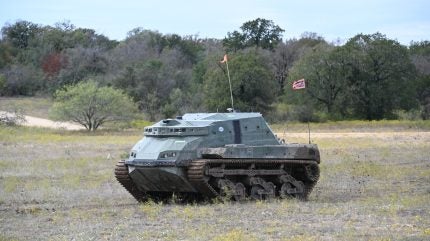
The US Defense Advanced Research Projects Agency (DARPA) has conducted autonomous movement tests on the RHP, as part of the Robotic Autonomy in Complex Environments with Resiliency (RACER) programme.
The RHP, a 12t, 20ft-long skid-steer tracked vehicle, underwent testing as part of the programme’s efforts to enhance adaptability and capability of RACER algorithms.

Discover B2B Marketing That Performs
Combine business intelligence and editorial excellence to reach engaged professionals across 36 leading media platforms.
These vehicles are similar in size to the upcoming robotic and optionally crewed combat vehicles, and complement the existing 2t, 11ft-long, Ackermann-steered and wheeled RACER Fleet Vehicles (RFVs).
The programme’s second phase commenced in autumn 2023 with its fourth experiment (E4), which included first testing of RHPs and RFVs by NASA’s Jet Propulsion Laboratory and University of Washington teams.
RACER E4, conducted at military training areas in Texas in late 2023, demonstrated the vehicles’ ability to autonomously navigate a 15-square-mile area with diverse terrain such as bushes, vegetation cover, rocks, slopes, trees and other obstacles.
It also showcased the vehicles’ capability to operate at night.

US Tariffs are shifting - will you react or anticipate?
Don’t let policy changes catch you off guard. Stay proactive with real-time data and expert analysis.
By GlobalDataThe two teams completed more than 30 autonomous runs on courses, which varied in length from three to ten miles, covering nearly 150 autonomous and unoccupied miles at maximum speeds of 30mph.
In addition, the programme saw commissioning of RHP at E4 by operating in an autonomous-route-following-mode for nearly 30 miles, undergoing similarly complex terrain to collect sensor data sets, evaluate low-level autonomous control, enhance operations and assess mobility.
The programme also focused on software development for global planning.
RACER Phase 2 performer teams include the Georgia Institute of Technology, University of Washington, NASA’s Jet Propulsion Laboratory, Overland AI, Offroad Autonomy and Duality Robotics.
Following the experiments in 2022 and 2023, RACER is planning two more tests in 2024 to maintain its biannual cadence of field tests, with continuous development and testing due to be conducted by Phase 2 teams at various local test sites.
RACER programme manager Stuart Young said: “RACER’s early Phase-2 activities, both with E4 performance successes in difficult, new-to-the-programme, military relevant terrain in Texas, as well as recent incorporation of RHP as a fleet platform is setting the tone for the programme to achieve tougher autonomous manoeuvre goals while showing autonomy resiliency and adaptability to new environments on any robot at any scale.”





